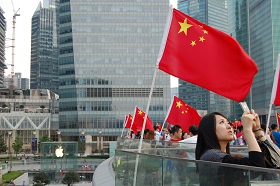On February 12, 2015 Chinese Foreign Minister Wang Yi paid a two-day visit to Islamabad. On the first day, he met with Advisor to the Prime Minister of Pakistan's National Security and Foreign Affairs Sartaj Aziz, spoke at a press conference, and held talks with President of Pakistan Mamnoon Hussein. On the second day, he held a detailed discussion with Prime Minister of Pakistan Nawaz Sharif.
On February 12, 2015 Chinese Foreign Minister Wang Yi paid a two-day visit to Islamabad. On the first day, he met with Advisor to the Prime Minister of Pakistan's National Security and Foreign Affairs Sartaj Aziz, spoke at a press conference, and held talks with President of Pakistan Mamnoon Hussein. On the second day, he held a detailed discussion with Prime Minister of Pakistan Nawaz Sharif.
Pakistan was the first stop on Wang Yi’s foreign tour, during which he will also visit the United Arab Emirates and Iran by February 16, 2015. The fact that the visit began with Islamabad is not accidental. It fits well into the traditionally close links between the two countries. Pakistan has long been regarded as a priority regional partner of Beijing. No wonder the bilateral relations between the two capitals are called not just strategic, but “all-weather” too. And the PRC grants this status only to selected friends.
However, the current visit has had its own peculiarity. The head of the Chinese Foreign Ministry announced at the above-mentioned press conference that the parties had time to discuss details of the state visit to Pakistan of President Xi Jinping “coming soon”. According to Pakistani media reports, the visit may take place in the third week of March. This event is quite remarkable and stands out against the background of close relations between the two countries (the last such visit took place in November 2006). The visit was originally scheduled for September 2014, but was postponed due to the worsening internal situation in Pakistan. As a result, a delicate situation emerged when the head of China visited Delhi, but did not go to Islamabad during the same trip. Now, this traditional balance, quite typical for South Asian visits of Chinese top officials, will be restored.
Wang Yi stressed that the parties had reached a “complete unanimity of views” on the issues discussed and once more called Pakistan “the best friend of China.”
The interest that China has again demonstrated in promoting relations with Pakistan is due to a number of factors. The first is the pursuit of regional geo-strategy, in which Pakistan has consistently acted as the major South Asian ally of China over many years of complicated Sino-Indian relations. In the last 10-15 years, the relationship between Beijing and New Delhi has improved significantly, not least because of the failure of China's unilateral “tilt toward Pakistan” in South Asia and China’s declaration of “neutrality” on the Kashmir issue. However, Pakistan continues to retain a “special place” in China’s policy. Discussions in various fields, including over military-political matter, are gaining momentum, and Pakistan, whose relations with India are even more complex, is clearly interested in close ties with China. It is not an accident, for example, that following the visit of Prime Minister of Pakistan to China in December 2014, when relations between the two countries were as usual called “strong as steel,” a major new package of more than 20 documents was signed.
Secondly, a case in point is the geopolitical interests of China: the Karakoram Highway provides Xinjiang a direct access to the Pakistani coast of the Indian Ocean. China is helping to build a multifunctional Gwadar Port just 240 miles from the mouth of the Strait of Hormuz (a third of all sea-borne shipped oil passes through it). Its value for the PRC in terms of economics and security goes beyond the scope of just Sino-Pakistani relations. There are projects to build bulk-oil port terminals that could deliver China with substantial amounts of vitally important oil from the Middle East by means of a pipeline running along the Karakorum highway and bypassing the long and not always safe sea routes. In addition, there are many media reports of Pakistani initiative to build a naval base near the commercial port in cooperation with China. However, such reports have not been confirmed officially by Beijing.
Thirdly, China cannot ignore the problems of terrorism and extremism, which have a direct bearing on the stability in the western regions of the country facing the threat of separatism. In this regard, the Chinese are well aware of the key position of Pakistan. The ability to exert influence on the situation in Pakistan is critically important for China in order to constrain the forces that are capable of delivering support to separatist elements in Xinjiang. Of course, Pakistan's involvement in the crisis in Afghanistan is being taken into consideration too. It is not accidental that Beijing is engaged in a dialogue with Islamabad on these issues not only in a bilateral format but also in multilateral fora, including the platforms of “China-Russia-Pakistan” and the “China-Pakistan-Afghanistan Dialogue,” which held its meeting in Islamabad on February 9, 2015. During his current visit, the Foreign Minister of China paid primary attention to the situation in Afghanistan, requiring a “compromise with all factions, including the movement of Taliban.”
There are ambitious economic proposals too. The China-Pakistan Economic corridor is a major development program under-construction whose importance goes beyond the scope of just an extensive multidisciplinary interaction. According to Beijing, it is also a pioneer project in the strategic program of “China’s unity with its neighboring countries.”
Many of the above issues (the economic corridor, Gwadar, terrorism, etc.) were included in the busy agenda of Wang Yi’s visit, testifying to a further development of the close bilateral dialogue.






